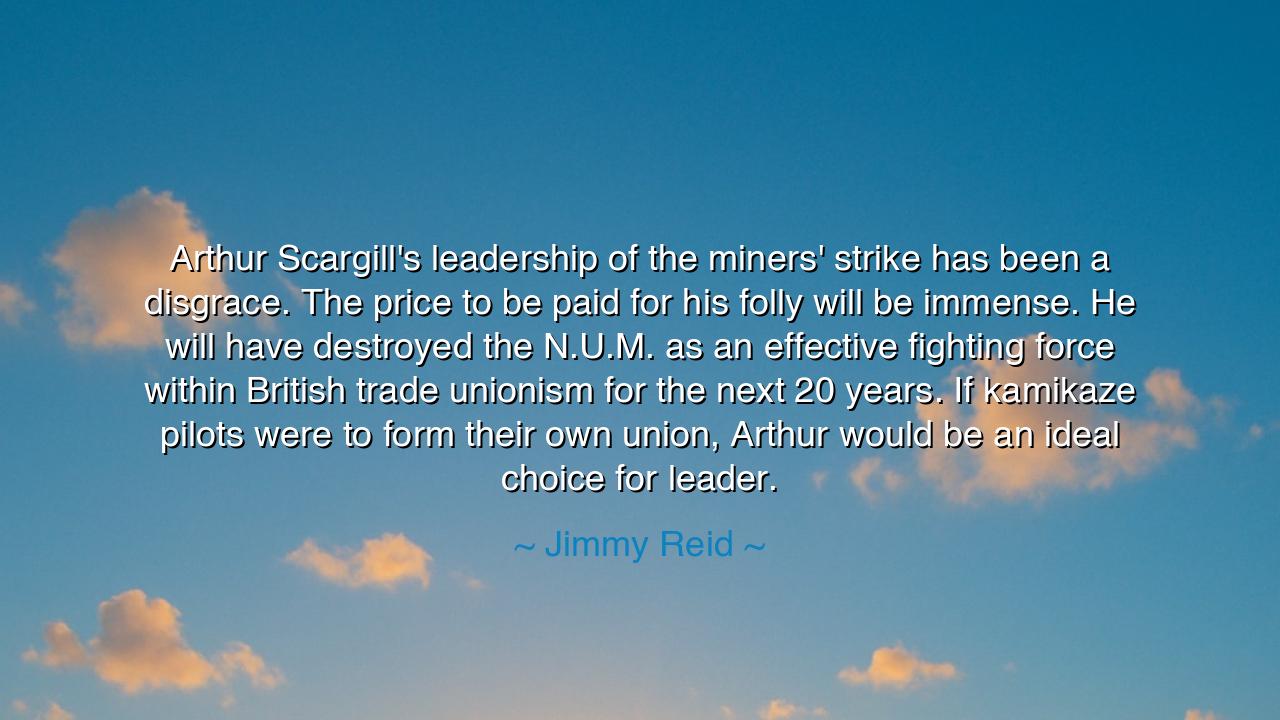
Arthur Scargill's leadership of the miners' strike has been a
Arthur Scargill's leadership of the miners' strike has been a disgrace. The price to be paid for his folly will be immense. He will have destroyed the N.U.M. as an effective fighting force within British trade unionism for the next 20 years. If kamikaze pilots were to form their own union, Arthur would be an ideal choice for leader.






Hear the words of Jimmy Reid, a man forged in the fires of labor struggle, who declared: “Arthur Scargill's leadership of the miners' strike has been a disgrace. The price to be paid for his folly will be immense. He will have destroyed the N.U.M. as an effective fighting force within British trade unionism for the next 20 years. If kamikaze pilots were to form their own union, Arthur would be an ideal choice for leader.” In these sharp and bitter words lies not only criticism, but also a timeless lesson about the weight of leadership, the danger of pride, and the cost when leaders guide their people without wisdom.
The ancients knew well that a leader’s recklessness could bring ruin upon even the strongest of causes. A general who marches his army into battle without food or preparation is not heroic—he is destructive. So too Reid accuses Scargill: that in seeking glory or vengeance, he led his miners into a conflict without strategy, without foresight, and without regard for the long-term survival of their union. For just as a reckless captain can sink a ship filled with brave sailors, so a reckless leader can destroy the very movement entrusted to his care.
Consider the historical backdrop. In 1984–1985, Britain’s miners stood against the government of Margaret Thatcher in one of the fiercest industrial disputes of modern times. Their struggle was not without cause: jobs, communities, and ways of life were at stake. Yet under Scargill’s leadership, there was no national ballot of the workers, no united front, no strategy that could endure the might of the state. Miners fought bravely, but divided. Families endured hardship, but without the chance of victory. Reid’s words burn with sorrow and anger, for he saw not only the defeat of the strike, but the crippling of the National Union of Mineworkers for generations.
History offers many parallels. Napoleon, in his hunger for conquest, marched his armies into the frozen depths of Russia, and the Grande Armée perished not for lack of courage, but for lack of wisdom in their leadership. So too Scargill’s miners were not lacking in resolve; they were betrayed by a commander who mistook stubbornness for strategy. Reid’s bitter comparison to kamikaze pilots is apt: men of zeal and bravery, but whose courage was squandered in missions of certain destruction, leading not to victory but to annihilation.
From these words emerges a profound truth: leadership is not merely about passion—it is about direction. A cause may be just, the people committed, the energy fierce; but if the leader does not temper zeal with wisdom, the fire consumes itself. To fight without foresight is not heroism but folly, and the cost is borne not by the leader alone, but by the countless lives who follow him in trust.
The meaning, then, is clear: true leadership must balance courage with prudence, vision with strategy, passion with patience. A leader who charges blindly may look bold, but in truth he betrays his people, for he sacrifices their strength upon the altar of his pride. Better to withdraw and fight another day with unity and preparation, than to squander lives and power in a battle already lost.
The lesson for us all is this: when entrusted with leadership, remember always that your choices do not fall upon yourself alone, but upon all who follow. Do not mistake stubbornness for strength, or recklessness for bravery. Seek counsel, unite your people, prepare your ground, and know when to fight and when to hold. For as Reid warns through his scathing words, the cost of folly in leadership is immense, and its wounds may last for generations.
Therefore, let your practice be this: in your own sphere, whether in family, in work, or in community, lead with wisdom as well as fire. If you guide others, let your passion be disciplined, your zeal be measured, your courage be tempered with foresight. For only in this balance will leadership preserve, protect, and uplift those who trust you. And remember always Reid’s warning: the leader who fails in this balance may destroy not only himself, but the very cause he sought to defend.






AAdministratorAdministrator
Welcome, honored guests. Please leave a comment, we will respond soon